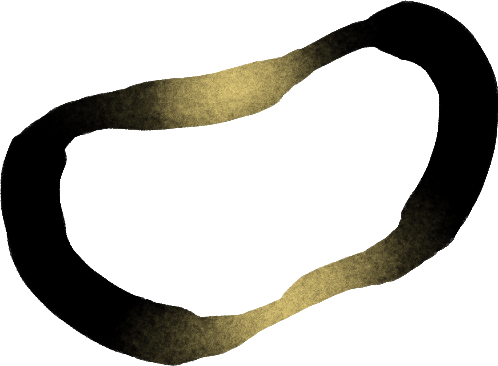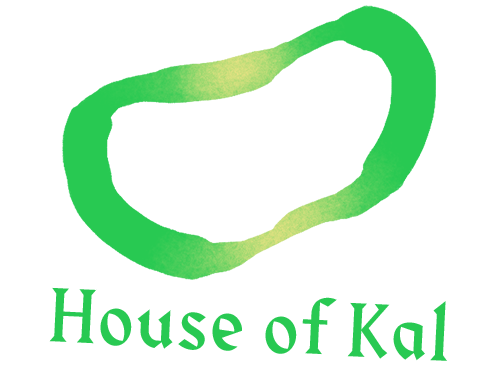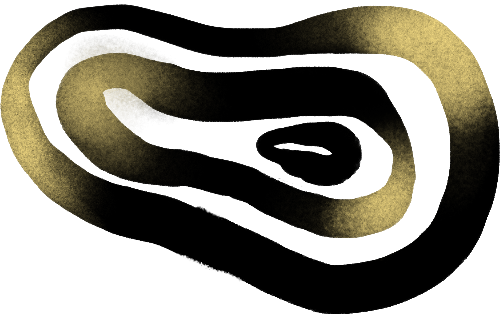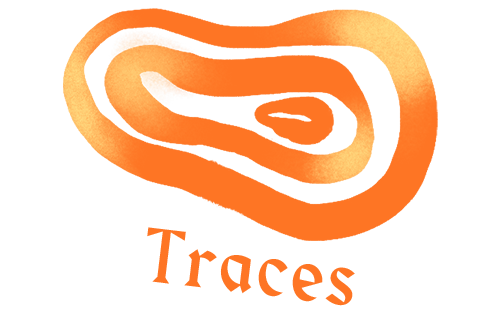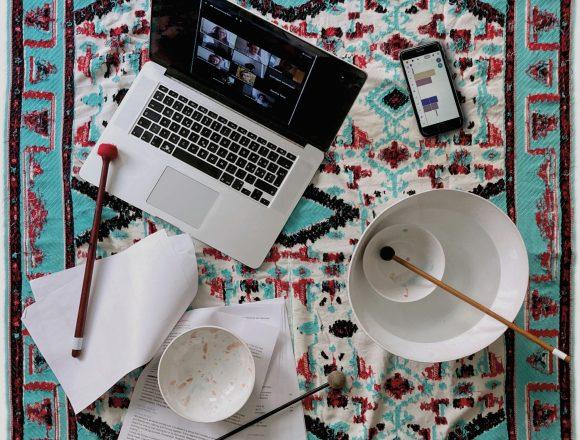radio kal is a fleeting space for artistic experimentation and for gathering community across space and time.
With radio kal it is our hope to create bridges that vibrate across multiple tongues, so we can listen to each other and share our worlds in story and song.
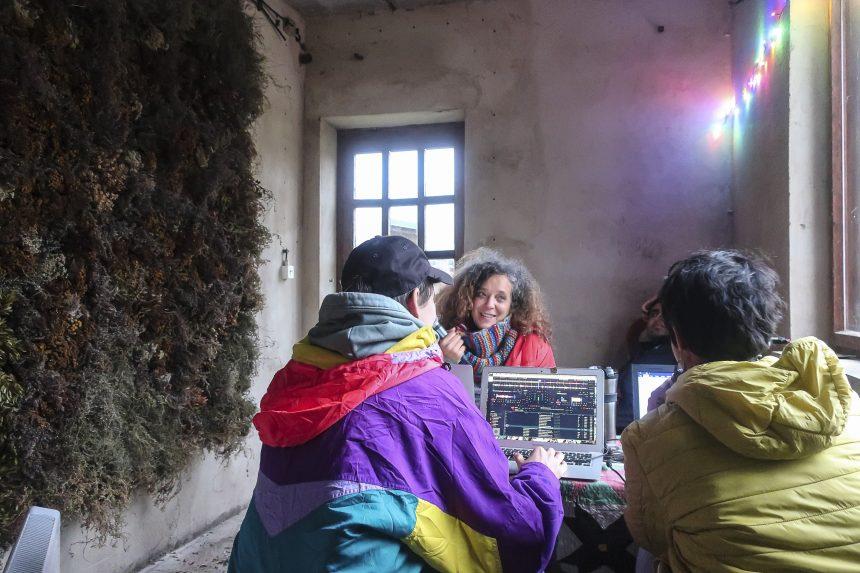
Knotweed Frequencies #1
Spectre in My Seed: Verdant Ghostcolonialisms
knowbotiq and Promona Sengupta
Something strange courses through the groundwater of Jeetze. At a glance, of course it is phosphate, considering that the land was collectivized and industrialized within the East Bloc model for years. Ever-fecund and hopped up on fertilizer, this land is not nature – it is industry.
On a second glance, with a second sight, what we see is that six feet under Jeetze, mixing with the waters, float ghosts and spirits, spectres and apparitions, carrying myriad histories of plant migration through colonialism. And these spectres are breaking out through the soil with their gnarled ghastly hands, flowering as invasive weeds that are threatening to take over.
Radio Kal RJ Promona Sengupta and Dark Ecology specialist Yvonne Wilhelm of knowbotiq offer practical tips and tricks learned from the ghostcolonial lands of Jeetze to callers and listeners who are struggling with ghosts haunting their own gardens and plants. Through two radio episodes that are aired according to the lunar almanac of dark goddess Kali, they gather together important information about post-industrial farming, plant migration and seed sovereignty in the wake of coloniality, the relationship of the supernatural with plants, food practices of the Bengal Famine and the otherworldly claims of psychoactive wild weeds. Deeply influenced by early independent India’s farmer-focused phone-in public programming such as Krishi Samaachaar and Krishi Kothar Ashor, Spectre in My Seed channels the ghostly frequencies of the postcolonial welfare state and land rights-related cultural programming, in the current context of the farmers protests on the borders of Delhi.
Knotweed Frequencies #2
sound into the tension as long as your breath can hold it
A Frei with Sakina Aliakbar, Suza Husse, Veenadara Lakshika Jayakody, Hema Shironi Joseph, Sophia-Layla Afsar, Alishba Memon, Ayesha Tariq, Basil Andrews, Betül Merve Tekoglu, Rheremita Cera, Sumugan Sivanesan, Seba Ali and Special Guest Izidora L LETHE
«(…) If it is a past thought for example reverse it so that you now see it as in front of you. If it is a future memory reverse it so that you now see it as behind you. Now, take one of the future thoughts you have reversed and build up a memory out of it. (…)» Black Quantum Futurism, Time Travel Experiment Number 2.
Connecting participants in and beyond Karachi, Colombo and Berlin, A Frei’s Relational Listening Composing Workshop was an experiment with relationality beyond linear notions of time, attunement toward difference and simultaneity of place and shared sonic fields.
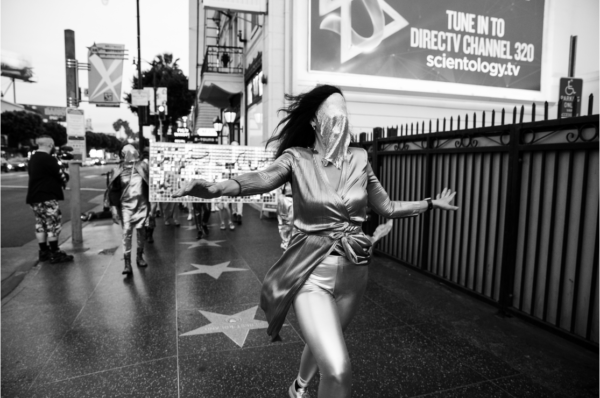
Knotweed Frequencies #3
the root of freedom comes from ‘friya’ which means beloved
Arshia Fatima Haq and Fatimah Asghar
«Our bodies are holding what our ancestors felt. If that was a pattern of flight, of, you know, we’re morphing in this pursuit of belonging. When that intersects with history, with a government, with a nation state that is really painful. I don’t believe in America and yet I do live in the government of America on stolen indigenous land. The way the West thinks about freedom as this individualistic pursuit. Actually, the root of freedom comes from ‘friya’ which is an indic root and it means beloved. The idea that freedom actually comes from being loved so strongly that you can do what you can do. It’s about kinship…» Fatimah Asghar in conversation with Arshia Fatima Haq
Conversation, poems and sound works by poet, film maker, educator and performer Fatimah Asghar and artist Arshia Fatima Haq, co-founder of the decolonial club space and record label Discostan. The radio kal episodes #1 and #2 (Knotweed Frequencies # 3 and #5) were recorded in Los Angeles in November 2020 and edited collectively across Colombo, Berlin, Karachi and Amsterdam during Shanti Suki Osman’s feminist radio workshop in December 2020.

Knotweed Frequencies #4
Sama: The Divine Listening Room
Arshia Fatima Haq with Raed Yassin
This episode of Radio Kal is an audio fragment of a worlding event that took place in the House of Kal Berlin on August 10, 2021. In a multisensorial performance and installation by Arshia Fatima Haq with Raed Yassin, the artists create an event of deep transformation by evoking the affective aural architecture of contemporary Islamicate devotion. Listen in to the encyclopaedic knowledge of this music and open yourself up to the arresting smells of itr that drip from the sonic notes of this episode.
Sample Music used by RJ Promona Sengupta: Hum Naye Geet Sunayein by Viva, 2002; Gur Nalo Ishq Mitha by Bally Sagoo feat. Malkit Singh, 1991; Music Copyright not owned by the Houses of Kal Berlin, Colombo, Karachi.
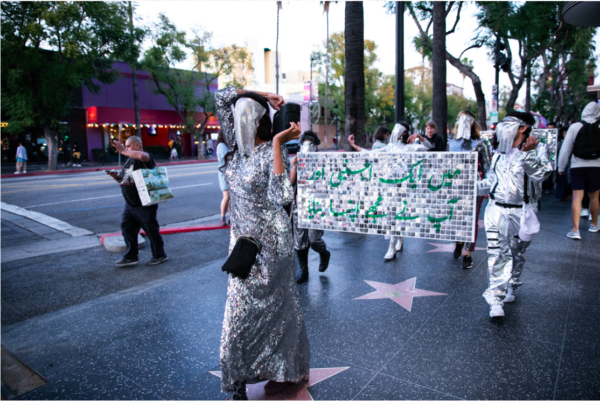
Knotweed Frequencies #5
Anytime you feel in that doubt, I hope that you can hear my voice
Arshia Fatima Haq and Fatimah Asghar
«…there is more to the story than we’re told or that we’re given in the books and in the histories. So much of it is women’s history, which as we know, is the one that is transmitted orally, transmitted through objects, through lived experience as you said that we don’t have recordings of. I have this ongoing conflict between wanting to share these learnings and also wanting to protect that knowledge because it is belonging to a certain community and to expose it makes it vulnerable to danger, to exploitation.» Arshia Fatima Haq Fatimah in conversation with Asghar
Conversation, poems and sound works by poet, film maker, educator and performer Fatimah Asghar and artist Arshia Fatima Haq, co-founder of the decolonial club space and record label Discostan. The radio kal episodes #1 and #2 (Knotweed Frequencies # 3 and #5) were recorded in Los Angeles in November 2020 and edited collectively across Colombo, Berlin, Karachi and Amsterdam during Shanti Suki Osman’s feminist radio workshop in December 2020.
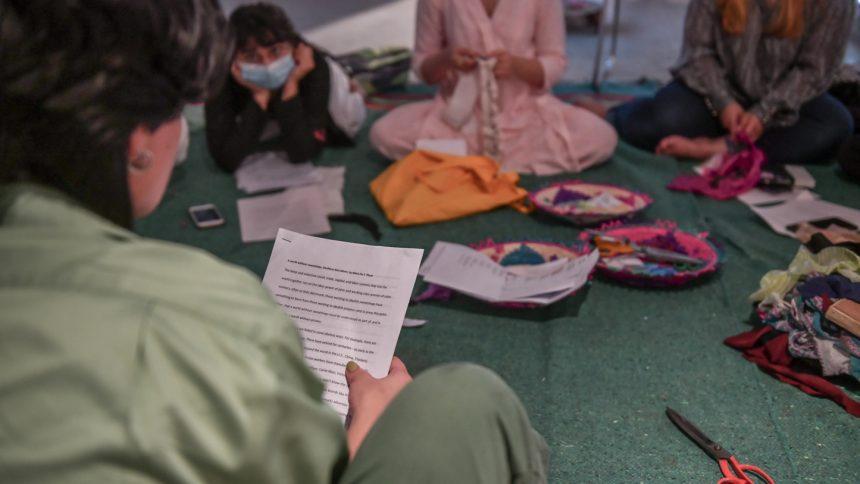
Knotweed Frequencies #6
Milna Julna/Coming Together: Transmissions from House of Kal Karachi
Ayesha Chaudhry, Sehan Khanna, Arham Bhaiji, Surkh Hina and anonymous poets
On this episode of Radio Kal, audiences are invited into the intimate space of care, sociality, love and relationality that is the House of Kal Karachi. Audio fragments from Milna Julna, a relational cloth-weaving session led by Ayesha Chaudhry, carry to our ears a series of poems recited in the silken tongues of participants, baring their care and softness through the shared tactility of cloth and word. We are also treated to the poetry of Sehan Khanna, Arham Bhaiji, Surkh Hina and other comrades as they share their lives and works as a part of the Sharing Circle, a safe space exercise led by Sehan Khanna as part of the Karachi House of Kal.
Sample Music used by RJ Promona Sengupta: Hum Naye Geet Sunayein by Viva, 2002; Gur Nalo Ishq Mitha by Bally Sagoo feat. Malkit Singh, 1991; Music Copyright not owned by the Houses of Kal Berlin, Colombo, Karachi.
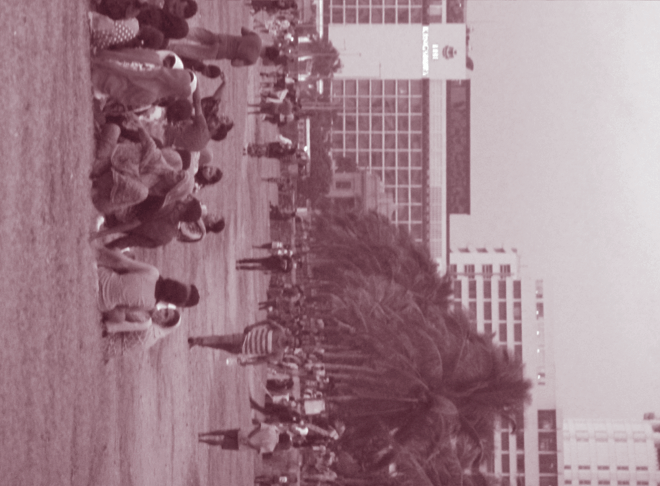
Knotweed Frequencies #7
Unlearning, Remaking, Remixing: Transmissions from House of Kal Colombo
Vicky Shahjahan, Chathuri Nissansala, Shiromi Subasinghe & R. Rasamma, Vasi Samumdra Devi
This episode of Radio Kal intentionally weaves together sound captures from performances that took place during the House of Kal Colombo Summer 2021. We feature the voices of Vicky Shahjahan, Chathuri Nissansala, Shiromi Subasinghe & R. Rasamma as part of two deeply intimate performances Birth & Mother this land is not ours examining relationships between matriarchy, intimacies and identity and the process of unlearning and reformulating to envision new futures. This episode also features audio logs of the lecture performance Artificial Women by Vasi Samumdra Devi. Based on real experiences and interactions with the trans community in Sri Lanka, interrogating the gender binaries in both language and experience created in a cis-het and normative culture and how we may undo, unlearn and challenge in order to live in non-binary ways.
Sample Music used by RJ Promona Sengupta: Hum Naye Geet Sunayein by Viva, 2002; Gur Nalo Ishq Mitha by Bally Sagoo feat. Malkit Singh, 1991; Music Copyright not owned by the Houses of Kal Berlin, Colombo, Karachi.
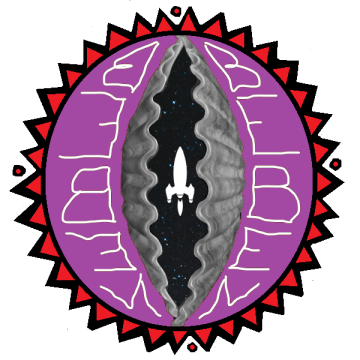
Knotweed Frequencies #8
Time Travel for All: Ship Logs of the SS Beben
This Episode of Radio Kal: Knotweed Frequencies contains ship logs from on board the deep space exploration vehicle called Beben that is steered across Alpha Centauri and Andromeda galaxies by an entirely FLINTAQ* transspecies crew of cosmonauts. The Spaceship Beben is a worlding event birthed and midwifed jointly by Captain Pro (Promona Sengupta), Nav Chief Hydra (Suza Husse), Pilot Tee (Teena Lange), Medical Officer Beung (Vicky Truong), Cosmic Oceanographer Sumo (Sumona Dhakal), Kita Commandanta Andrea (Andrea Goetzke) and others crew-mates in the House of Kal Berlin. This episode contains a mix of autobiographical logs by different crew members, loud arguments and discussion circles, impatiently voicenoted recipes and an eclectic on-board playlist. The Beben dispatches give our listeners a rare peek into the adventurous everyday lives of time travellers living many lightyears above us in the sky, searching inside uncharted blackholes for a dignified FLINTAQ* life beyond alienation.
Sample Music used by Captain Pro aka RJ Promona Sengupta: Hum Naye Geet Sunayein by Viva, 2002; Gur Nalo Ishq Mitha by Bally Sagoo feat. Malkit Singh, 1991; Aaj Sajan Sang/ Bandish in Hamsadhwani by Kishori Amonkar; Prettiest Virgin by Agar Agar, 2016; Baro Maashe Tero Phool Phote by Pratima Baruah and Bhupen Hazarika; Symphony No.7 in A major op.92 – II, Allegretto by Ludwig Von Beethoven; Utonut by Molchat Doma, 2020; 1992 by No_4mat, 1992; Don’t It Make My Brown Eyes Blue by Crystal Gayle,1977; Dances for Harp and Orchestra, L. 103: 2. Danse profane by Claude Debussy; Who Knows by Marion Black, 2004; Dehotori Dilam Chhari O by Hemanga Biswas; Romeo and Juliet: No.13 Dance of the Knights by Sergei Prokofiev; Music Copyright not owned by the Houses of Kal Berlin, Colombo, Karachi.
Sampled Text: The Communist Manifesto by Karl Marx and Friedrich Engels, Bengali Translation.
Knotweed Frequencies #9
Aural Sex: The Hour of Kali
Late-night radio transmission live on radio kal with RJs Captain Pro and Nav Chief Hydra
RJs Captain Pro and Nav Chief Hydra hole themselves up in the DMRS Jeetze transmission station on the dark night of the New Moon in Sagittarius, a month after the New Moon of Kali, the goddess of Death. Marking the end of the cycle of the dark goddess in this earthly realm, this transmission takes a deep dive into the realm of ghosts and horror radio programming. Sound waves and the acoustic world become carriers of intense corporeal sensations such as goosebumps and jump-scares. The two unlikely RJs discuss the scope of radio and its subversive shift from being a war machine to a love machine. The original combative urgency and fascist affect of the form are transformed for the listeners, pulling them close inside an aural world, through ghost stories and the intimacies of a body-genre such as horror, and other tools such as ASMR and foley creation.
radio kal is a fleeting space for artistic experimentation and for gathering community across space and time. With radio kal it is our hope to create bridges that vibrate across multiple tongues, so we can listen to each other and share our worlds in story and song. It proposes a space to speak about experiences and engagements that connect art, activism, diaspora, migration, ecology, collectivity, family, love and sexuality. The resulting episodes, produced in intervals over the coming year, are collectively created, allowing for forms of learning together.
In this mode, radio kal is DIY from the outset. A series of radio workshops and online tutorials with the sound & radio artist Shanti Suki Osman, video artist, researcher and educator Dafne Narvaez Berlfein and academic, activist and curator Promona Sengupta opens the platform for learning and making experimental and critical radio together. Rooted in feminist methodologies the tooling workshops also channel some of the wealth of knowledge of doing radio formats online that has become available with the pandemic. A second set of radio performance workshops unfolding in summer 2021 will be led by artist, sonic researcher, DJ, and record store co-founder (OOR Records) A Frei.


